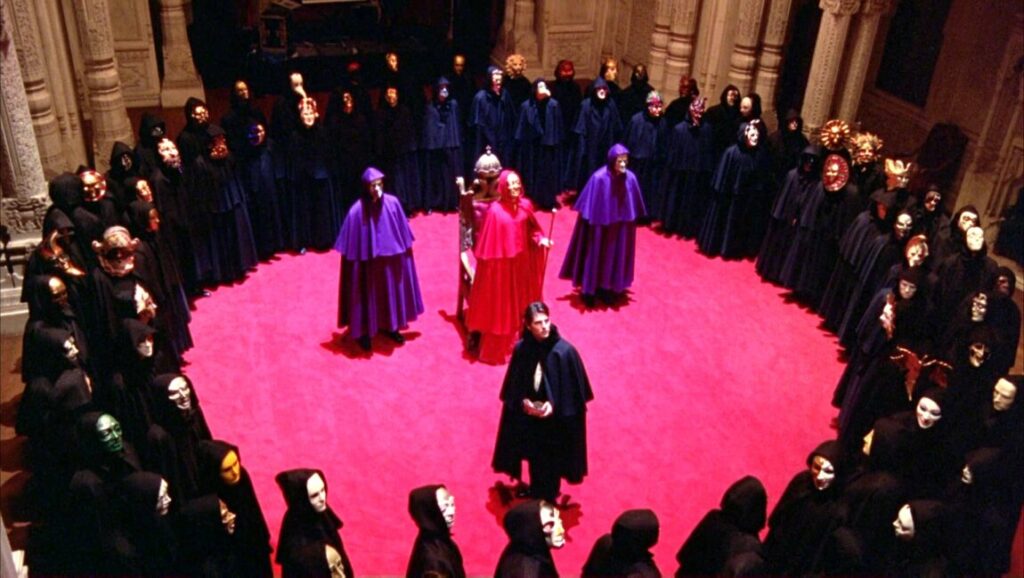Stanley Kubrick’s final film is one of the least-sexy films ever made about sex. Libidinous, yes, and full of naked bodies in salacious motion, engaging in lubricious acts — but also off-putting, too meticulous to be arousing. Eyes Wide Shut is a dreamy traipse through the nocturnal fantasies of a successful Manhattan doctor (Tom Cruise) who, married to a beautiful woman (Nicole Kidman), nonetheless finds himself beguiled by the promise of debauchery and deviancy when he discovers that his moneyed patients are part of a secret sex cult — or so it seems. At one of their parties, which take place in a mansion outside the city, this doctor, out of his element (he arrives in a yellow cab), gets a glimpse of a privileged, perverse world he was never meant to see. And down the proverbial rabbit hole he goes, increasing disoriented, understanding less the more he learns.
Ostensibly an adaptation of Arthur Schnitzler’s novella, Traumnovelle, and inspired by George Bataille’s Story of the Eye (both are about compulsive sexual behavior and aberrance), the film explores the dichotomy between domestic routines and primal sexuality, and the innate intermingling of the two — the eros and ethos of married life, deviancy born of banality and boredom.
A proliferation of prostitutes and men garbed in robes and eerie masks; a permeation of sparse Viennese music, lingering like an unsound apparition; iridescent apartments done up with Christmas decorations, all aglow and jovial — the New York of Eyes Wide Shut is an obvious simulacrum, based not on reality but on a notion of reality, a dream. Shot on a soundstage, an exact emulation of New York, Eyes Wide Shut is pervaded by a sense of unease and unreality. It’s a film of artifice: notice the unnatural blue light that seeps through windows at night, or the dearth of people on the New York streets. Around this ersatz, labyrinthine Manhattan, our discombobulated doctor walks, enshrouded by night and an unshakeable feeling that he’s being followed. There’s a tautological quality to Cruise’s flummoxed doctor, the way he repeats things people say. He seems less like a person than a horny husk. Into the dark night of the soul sneaks Cruise, running away from his mundane marriage, chasing after specters of temptation. Kubrick, one of the most precise and clinical of filmmakers, shows little interest in exploring the emotional aspects of carnality, and seems equally uninterested in titillation. Ostensibly an adaptation of Arthur Schnitzler’s novella, Traumnovelle, and inspired by George Bataille’s Story of the Eye (both are about compulsive sexual behavior and aberrance), the film explores the dichotomy between domestic routines and primal sexuality, and the innate intermingling of the two — the eros and ethos of married life, deviancy born of banality and boredom.
Part of Kicking the Canon – The Film Canon.


Comments are closed.